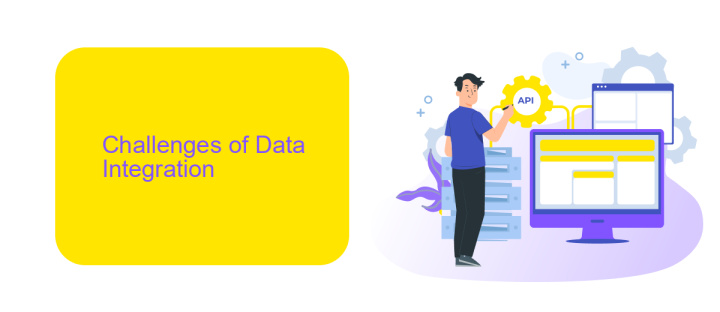Data Integration Progress
In today's rapidly evolving digital landscape, data integration has become a crucial element for businesses striving to maintain a competitive edge. As organizations collect vast amounts of data from diverse sources, the ability to seamlessly integrate and analyze this information is essential. This article explores the latest advancements in data integration technologies, highlighting their impact on operational efficiency and decision-making processes.
Introduction
Data integration is a critical process for organizations aiming to consolidate information from various sources into a unified view. This integration is essential for improving data accessibility, enhancing decision-making, and streamlining operations. As businesses grow and adopt more digital tools, the challenge of integrating disparate data sources becomes increasingly complex.
- Improved data quality and consistency
- Enhanced operational efficiency
- Better decision-making capabilities
- Streamlined business processes
One effective solution for managing data integration is leveraging specialized services like ApiX-Drive. ApiX-Drive simplifies the integration process by providing an intuitive platform that connects various applications and automates data transfer. This service not only reduces the technical burden on IT teams but also ensures that data flows seamlessly between systems, enabling businesses to focus on their core activities and strategic goals.
Challenges of Data Integration

Data integration poses numerous challenges that can complicate the process of merging and managing data from diverse sources. One of the primary challenges is data inconsistency, where data from different sources may have varying formats, structures, and standards. This inconsistency can lead to errors and misinterpretations, making it difficult to achieve a unified view of the data. Additionally, data security and privacy concerns are paramount, as integrating data often involves sensitive information that must be protected from unauthorized access and breaches.
Another significant challenge is the scalability of data integration solutions. As organizations grow and accumulate more data, their integration systems must be able to handle increasing volumes of data efficiently. Manual integration processes can be time-consuming and error-prone, which is where automated integration services like ApiX-Drive come into play. ApiX-Drive simplifies the integration process by offering a user-friendly platform that connects various applications and services seamlessly. By automating data transfers and ensuring data consistency, ApiX-Drive helps organizations overcome many of the common challenges associated with data integration.
Progress in Data Integration Technology

The field of data integration technology has seen significant advancements in recent years. These improvements have streamlined the process of combining data from different sources, facilitating better decision-making and operational efficiency. Modern tools and platforms are designed to handle the complexities of data integration, ensuring seamless connectivity and real-time data flow.
- Automation: Modern data integration tools, such as ApiX-Drive, automate data synchronization between various applications, reducing manual effort and minimizing errors.
- Scalability: These tools are built to scale, accommodating growing data volumes and increasing the number of data sources without compromising performance.
- Real-Time Processing: Advanced integration platforms support real-time data processing, providing up-to-date information for timely decision-making.
With the continuous evolution of data integration technology, businesses can leverage these advancements to enhance their data management strategies. Services like ApiX-Drive offer user-friendly interfaces and robust features, making it easier for organizations to set up and maintain their data integrations efficiently. This progress ensures that companies can stay competitive in an increasingly data-driven world.
Recent Advancements and Innovations

In recent years, the field of data integration has experienced significant advancements, driven by the increasing need for seamless data flow across various platforms and applications. These innovations have transformed how businesses manage, process, and utilize their data, ensuring more efficient and effective operations.
One of the most notable advancements is the development of automated integration tools that simplify the process of connecting disparate data sources. These tools eliminate the need for manual coding and reduce the time required for integration, allowing businesses to focus on more strategic tasks.
- Enhanced data mapping and transformation capabilities
- Real-time data synchronization
- Advanced error handling and monitoring
- Integration with cloud-based services
Services like ApiX-Drive have been at the forefront of these innovations, offering user-friendly platforms that enable businesses to set up integrations quickly and efficiently. By leveraging such tools, organizations can ensure that their data is always up-to-date and accessible, driving better decision-making and operational efficiency.


Future Directions in Data Integration
As data integration continues to evolve, future directions will likely focus on enhancing automation and improving real-time data processing capabilities. With the increasing volume and variety of data, automated tools and platforms will become essential for seamless integration. Services like ApiX-Drive, which offer user-friendly interfaces and robust automation features, will play a crucial role in simplifying the integration process and minimizing manual intervention. This will allow organizations to efficiently manage and utilize their data, leading to more informed decision-making and operational efficiency.
Another significant trend will be the emphasis on data security and compliance. As regulatory requirements grow stricter, ensuring secure data transfer and storage will be paramount. Future data integration solutions will need to incorporate advanced encryption techniques and compliance monitoring to safeguard sensitive information. Additionally, the rise of artificial intelligence and machine learning will further enhance data integration processes by enabling predictive analytics and intelligent data mapping. These advancements will drive more accurate and efficient data integration, paving the way for innovative applications and business models.
FAQ
What is data integration and why is it important?
How can I track the progress of data integration in my organization?
What challenges might I face during data integration?
Are there tools available to automate data integration processes?
How do I ensure data security during the integration process?
Apix-Drive will help optimize business processes, save you from a lot of routine tasks and unnecessary costs for automation, attracting additional specialists. Try setting up a free test connection with ApiX-Drive and see for yourself. Now you have to think about where to invest the freed time and money!

